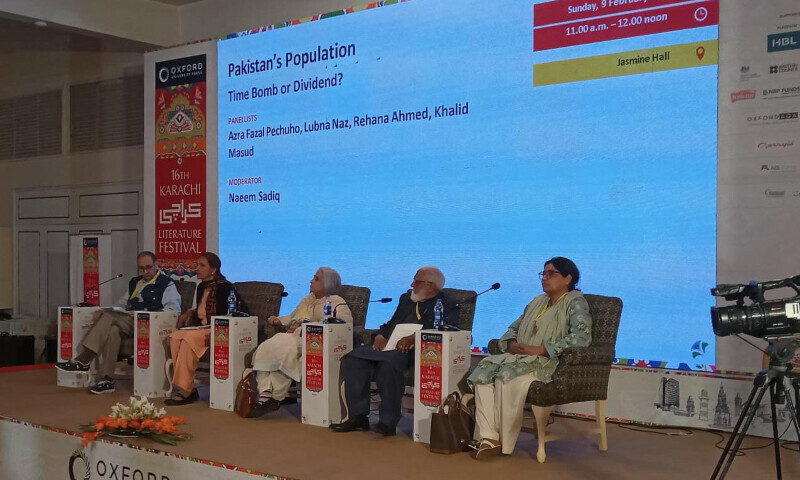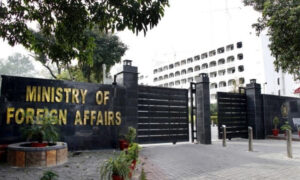Public health experts on Sunday urged the government to adopt an urgent, multipronged strategy to address unsustainable population growth and enhance family planning initiatives in Pakistan as they spoke during a panel discussion on the third day of the 16th Karachi Literature Festival (KLF).
As of 2023, Pakistan’s population has surged to approximately 241.49 million, reflecting an increase of about 33.8m people since 2017.
This growth rate of 2.55 per cent is among the highest globally, significantly exceeding the global average of 0.8pc. If this trend continues unchecked, projections suggest that Pakistan’s population could double by 2050, potentially reaching 403m.
The panel was moderated by Naeem Sadiq and included Sindh Health Minister Dr Azra Pechuho, Dr Lubna Naz, Dr Rehana Ahmed and Council of Islamic Ideology (CII) former chairman Dr Khalid Masood as speakers who held a discussion titled, ‘Pakistan’s Population: Time Bomb or Dividend?’
Dr Pechuho, speaking about 82pc of funds of the National Finance Commission (NFC) award being allocated based on population, said: “The political buy-in for family planning is affected because politicians think that if they reduce the population, their share in the NFC award would be reduced — after all, money talks, and that’s why its weightage needs to be reduced.”
She added, “I think the federal government has to decide on these two factors. How do you see this explosive population, and how do you address this issue of high population growth?”
She added that the Sindh government, realising the importance of the issue, had merged the health and population welfare ministry.
Dr Rehana Ahmed, speaking on the issue said, “Pakistan has absolutely no excuse to continue with the rapid population growth rate.”
She added that both the private and public sector needed to be engaged, saying, “The private sector, with its big role in the health system, is currently offering good services.
“However, the focus of the private sector is on revenue-generating curative services. So what about the national priorities? That is the area where we are lagging.”
Clarifying that misconception that family planning was not about stopping births, she continued: “It is not. It is about having planned children to support the children and empower the parents through family planning.”
Former CCI Chairman Dr Masood spoke on religious barriers or prohibitions regarding family planning, saying: “This is correct that this is a difference of opinion on this matter, which we fear in the modern era because this hampers building a consensus on the matter.
“However, throughout our Islamic history, there has been a difference of opinion on matters,” he said, adding that he appreciated the topic being in the public sphere.
“Although there was a difference of opinion, it was not in objection to the matter of family planning itself. It is important and it requires a policy as well,” Dr Masood said.
He continued that there was nothing in the Quran to oppose family planning, saying: “That the verse in the Quran misquoted on the topic had to do with the killing of children, not about contraceptives use or a gap between pregnenacies.”
He added that Islamic scholars had given permission for family planning in an individual capacity but not as a policy matter, adding that “since the matter pertained to the collective well-being of the nation, the precedent in Islamic history gave political leaders the final say on the matter and clergy had to follow the consensus.”
He added, “A fatwa remained in an individual capacity and a law overrules an individual ruling.”
Dr Lubna Naz spoke on the topic of the correlation between economics and population growth. “Increasing poverty hampers family planning initiatives as people look to children as earning hands,” she said.
Quoting the issue of child labour as an example, she added: “Population control can not be achieved until a multi-sectoral approach is taken on the issue, and the lack of integration of policies affected initiatives in a negative manner.”
Speaking about the gap in unemployment between men and women in the country, she said, “We have not created an environment where women can feel safe and work which also affects population control initiatives.”
Sadiq pointed out that, “The total fertility rate (TFR) is the average number of children a woman will have during her lifetime. Pakistan, however, despite being the world’s fifth-most populous nation, seems to be stuck at an unsustainable TFR of 3.6.”
Dr Naz added that “electoral politics needs to be linked with political wellbeing, at least at a local government level.”
Economist Dr Kaiser Bengali, addressing the panel, slightly differed on the topic of the NFC with Dr Azra, however, he also agreed that “adding the TFR as additional criteria is very valid.”
- Desk Reporthttps://foresightmags.com/author/admin/











